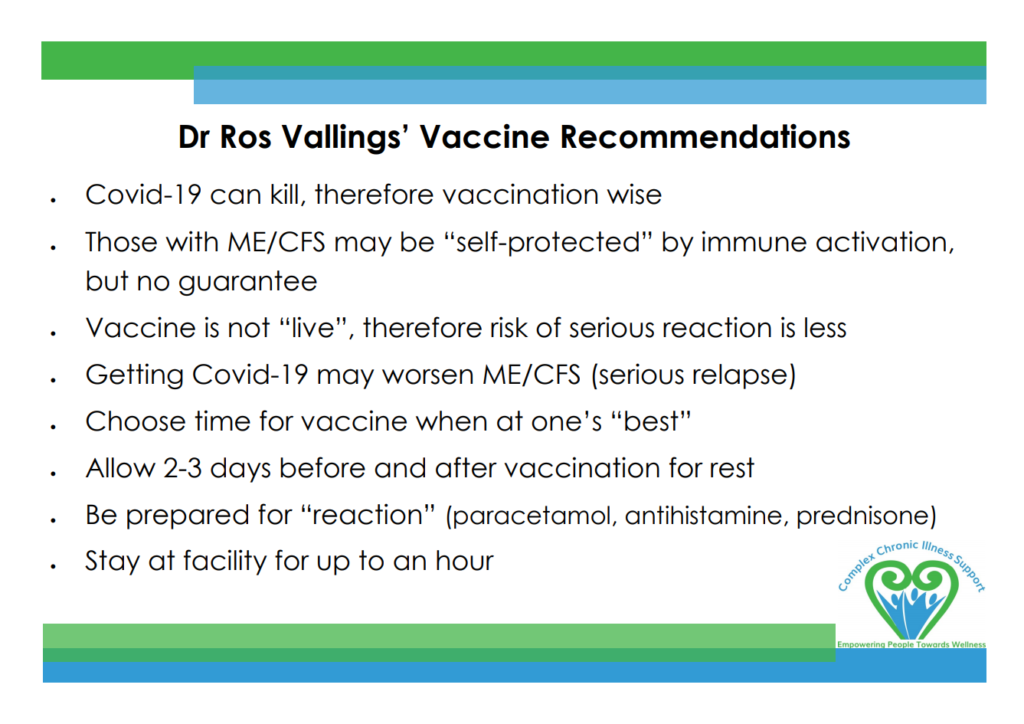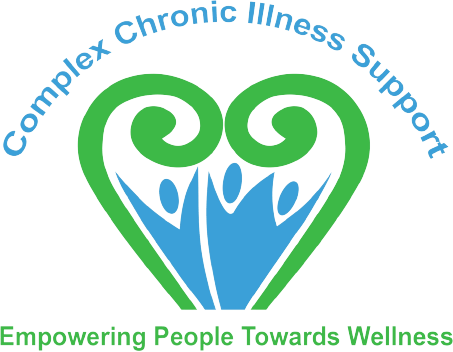NZ Covid Vaccine
Below is some general advice on the Covid-19 Vaccine which Dr Ros Vallings spoke about during her presentation at the public talk held in Hamilton last month for the launch of CCIS Waikato.
The entire meeting will be available on Video soon.

Experts from around the world weigh in on Covid-19 Vaccination and ME/CFS FM
Those with ME/CFS FM may naturally be cautious when considering whether the Covid-19 vaccine is appropriate for them. Millions of people have now received the Covid-19 vaccine. In fact, there have been 1.15 billion doses given worldwide and few published reports of severe side effects. To date, 1.2% of the New Zealand population have been fully vaccinated, therefore we still have a long way to go to achieve herd immunity. New Zealand has now secured enough Covid-19 vaccines for everyone, please refer to this Ministry of Health link detailing safety and approval and the vaccine the roll out plan MOH Covid-19 Vaccines.
Below you can read recommendations from ME/CFS practitioners and researchers about staying protected against the virus. Most importantly, speak with your GP who will be able to discuss and advise on what is best for your unique health situation.
Dr Charles Lapp from the Hunter Hopkins Centre, P.A.
The Pfizer and Moderna products are not made from live virus, so they are not likely to cause flares or relapses in our PWCs. They both require two doses 21 to 28 days apart. It takes about 2-3 weeks to develop a 50% level of immunity after the first dose, and that level persists for just a few weeks so the second immunization is necessary. The vaccines are about 90-95% effective, but there is no data yet on how long such immunity will last. Side effects of the vaccination include injection site soreness and fever in most cases, increased fatigue (up to 60%), headache (up to 50%), muscle aches (37%), and chills (32%), especially after the second jab. These symptoms resolve in 24 to 48 hours, and a minority of individuals has to take Tylenol or other remedies for them.
Our concern is not the short-term effects, but long term. The Pfizer and Moderna vaccines have been administered safely to thousands of individuals already, but new issues are likely to arise after millions of individuals have been immunized.
Because COVID-19 is such a severe disease we currently recommend that high risk individuals strongly consider vaccination. These include individuals with high blood pressure, diabetes, obesity, asthma or pulmonary disease, cardiovascular disease, and immune deficiency. The vaccines have not been adequately tested in pregnant or lactating women, or in children under 16 years.
Since PWCs frequently suffer immune dysregulation, many wonder if they should be considered “immune deficient.” Our opinion is that many patients have an UP-regulated immune system and fend off viruses readily, so they rarely fall ill. If you are the type of individual who “catches every virus that comes along,” then you are probably in the minority of DOWN-regulated patients and should highly consider the vaccination when it is available.
Despite immunization there is still a small but significant chance one could contract COVID-19; therefore, prevention is KEY. Dr. Lapp has just reviewed dozens of past epidemics and one point is clear: frequent washing, hand sanitizing, face masks, and isolation are crucial for avoiding infection.
Full article can be found using the following link https://drlapp.com/ask-the-doctor/covid-19-vaccines/
Dr Bateman for the Bateman Horne Center
We [the world] certainly need COVID-19 vaccines desperately and everyone who is healthy enough for the vaccine should get vaccinated, starting with those at highest risk of COVID exposure. This includes healthy family members of vulnerable people. For the ME/CFS/FM population, my advice is to stay safely quarantined and wait a couple of months while the vaccine is distributed and broadly administered. Because of the large numbers and close monitoring, we should know fairly quickly how people do with the vaccines. This advice will apply as each new branded vaccine is approved and rolled out. In general, the people who should be most cautious are those who have previously had allergic reactions to vaccines or are prone to severe allergic reactions in general. If you decide to get the vaccine, be rested and stable prior to the vaccine, and plan on resting/relaxing for at least 72 hours afterward. Supportive care will include anything you usually do for flu symptoms, PEM, allergy flares, worsened orthostatic intolerance, etc. If anything, including a vaccine, makes you sick enough that you are unable to maintain adequate fluids and nutrition, or results in fluid and electrolyte losses (sweating, diarrhea, etc.), it is always appropriate to seek IV fluids as a primary intervention.
Full article can be found using the following link https://batemanhornecenter.org/wp-content/uploads/filebase/COVIDVaccineGuide01072021.pdf
Nancy Klimas, MD, Director, INIM for the Institute for Neuro-Immune Medicine
COVID kills people. It kills people with over activated and damaged immune systems preferentially – and that is what ME/CFS is all about. So while there certainly is a risk of an ME relapse with these hyper reactive vaccines (the first wave to be released), you have to weigh the possibility of an ME relapse against the risk of death from COVID-19.
You can mitigate the risk in a number of ways – just the way you do when you feel a relapse coming on. Before the vaccine, make sure you are taking enough antioxidants, particularly NAC or glutathione and CoQ10. The big mediator of post vaccination relapse and immediate reactions is mast cell activation. If it happens immediately, that is anaphylaxis, but if it happens slowly and low grade over days the mediators mast cells release can drive a classic ME/CFS relapse. So, take an antihistamine before and for several days after the vaccine – the strongest one you can tolerate. (Benadryl is one of the strongest, Zyrtec is another good choice). There are many mast cell stabilizers; watch Dr. Maitland’s excellent lecture from out recent CME Workshop: Managing the Syndrome Soup: POTS, EDS, MCAS & ME/CFS, if you want to know more: http://bit.ly/NovaDysCME.
There are natural supplements that act to block or clear histamine and stabilize mast cells such as alpha lipoic acid, ascorbic acid, B6, diamine oxidase enzymes (DAO), luteolin, N-acetylcysteine (NAC), Omega-3’s, riboflavin, SAMe, quercetin, and natural sources of theophylline like green and black teas. If you have been diagnosed with mast cell activation syndrome, it would make sense that your risk of an immediate reaction to any vaccine should be higher, though the data on the risk to people with mast cell activation syndrome or prior vaccine allergic reactions is not yet known with the COVID-19 vaccines. I suspect we will know fairly quickly, with millions of doses already administered. So you may want to wait (taking all of the COVID-19 precautions very seriously). If you do take the vaccine, plan to stay in the medical setting for at least 30 minutes, consider several hours, to be in a safe place if you do have a reaction. In this special circumstance, premedication with a steroid, the same way we premedicate people who need a CT scan with iodine contrast dye, could be provided by your physician.
Please note: that if you take the vaccine you should take the whole recommended dose, and the current vaccines, Pfizer and Moderna, should be administered twice. It is not yet known how long the immunity will last, but there are blood tests that look at antibody levels available. Although they came to the market very quickly, we will know more about the quality of the antibody tests over the next few months. Most importantly, vaccination is not 100% (in fact the two initial vaccines trials were 95% effective in preventing or reducing the severity of infection). Vaccination does not exclude strict social distancing guidelines and mask wearing until “herd immunity” levels of vaccination have been reached (70% of the population)!
Of course, these recommendations are simply my opinion, and we will know a lot more about safety in the coming months – but 30,000 plus folks took the vaccines in the trials (that’s a lot) and you must be moved by the photos of health care professionals lining up to receive their vaccine. Is there a risk? Yes. There is certainly more of a risk of ME/CFS relapse than anaphylaxis, which should be manageable. Is it worth it? Your decision, weighing all that you can find out. More than 330,000 Americans have died. The new strain of the virus is likely to make our current rate of infection go much higher. Please take this seriously
Full article can be found using the following link https://www.nova.edu/nim/To-Vaccinate-or-Not-with-MECFS.html
Charlotte is the Tauranga and Western Bay of Plenty
Health & Wellness Facilitator
References
Bateman. (2021). Covid-19 vaccine guide. https://batemanhornecenter.org/wp-content/uploads/filebase/COVIDVaccineGuide01072021.pdf
Klimas, N. (2020). To Vaccinate or not – with ME/CFS. https://www.nova.edu/nim/To-Vaccinate-or-Not-with-MECFS.html
Lapp, C. (2020). COVID-19 vaccines. https://drlapp.com/ask-the-doctor/covid-19-vaccines/
Ministry of Health. (2021). Covid-19: Vaccines. https://www.health.govt.nz/our-work/diseases-and-conditions/covid-19-novel-coronavirus/covid-19-vaccines
Our World Data. (n.d.). Coronavirus (COVID-19) vaccinations. https://ourworldindata.org/covid-vaccinations?country=OWID_WRL

